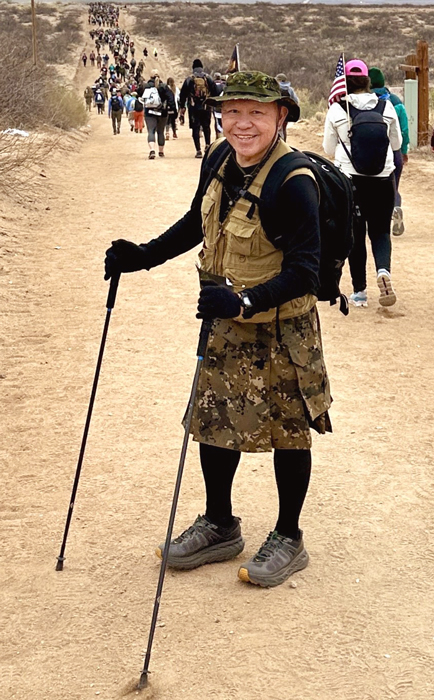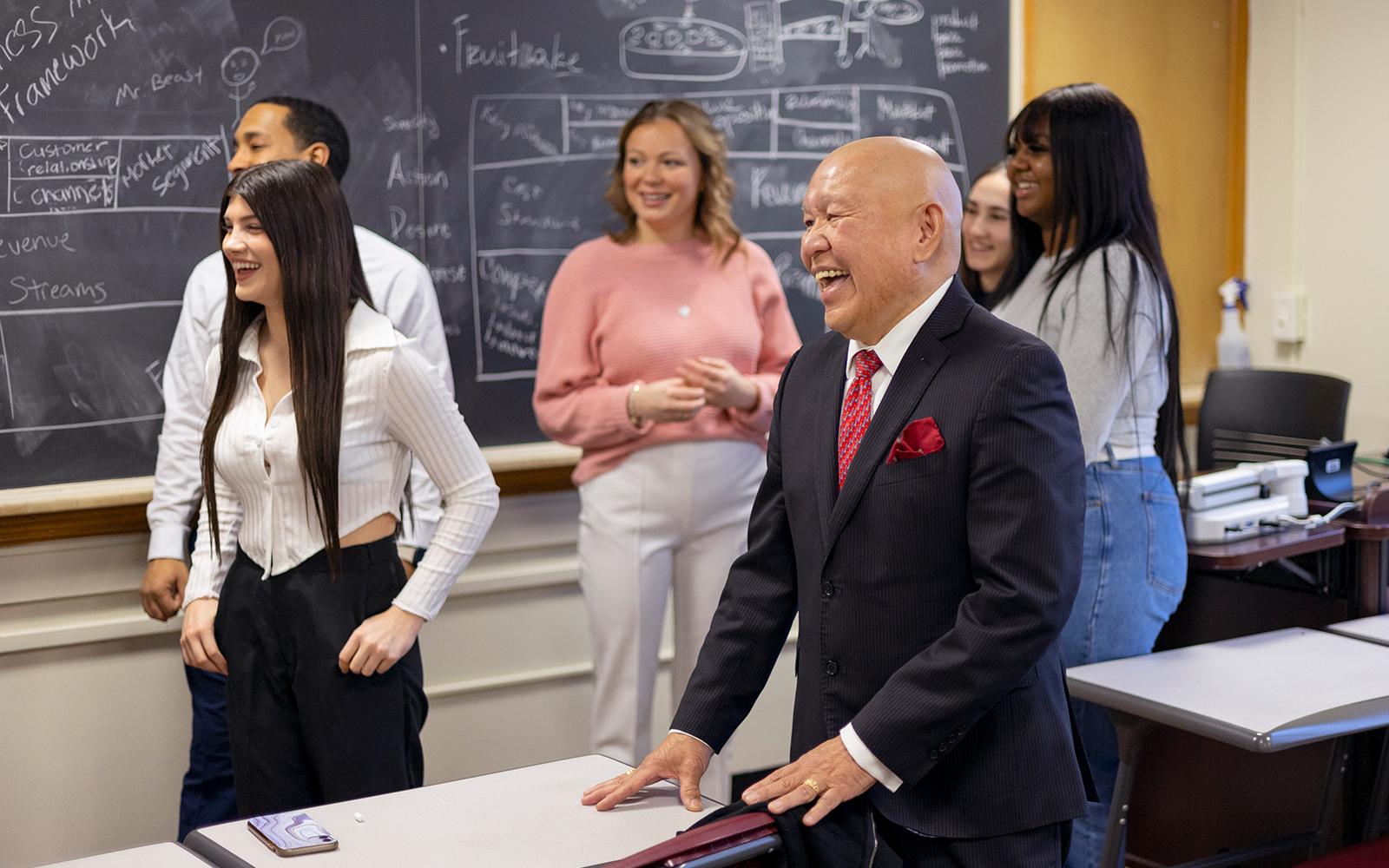As he marched through the high desert of New Mexico, with sand filling his shoes and the sun beating down on him, SUNY Potsdam Professor Dr. Edwin Portugal was reminded that the physical challenges facing him during his 26.2-mile march were nothing compared to what thousands of Filipino and American soldiers endured during the Bataan Death March in 1942.
During the Spring of 2025, Portugal returned from a trip to the southwest, where he completed his 12th Bataan Memorial Death March—an intensive trek through the White Sands Missile Range in New Mexico. The annual event draws thousands of U.S. soldiers, ROTC students, and civilians who gather to memorialize the Bataan Death March in the Philippines during World War II, in which 60,000 to 80,000 Filipino and American soldiers were forced to walk more than 60 miles, and suffer through severe physical abuse, on their way to confinement camps. More than 1,000 Americans and 9,000 Filipinos died during the Bataan Death March.
“The march pays homage to the survivors and the thousands who died along the way. When the course gets tough, I remind myself of the sacrifices the soldiers endured to survive the forced march."
SUNY Potsdam Business Professor
 Portugal, who is of Filipino descent, first learned about the Bataan Memorial Death March more than a decade ago, when he was thumbing through Runner’s World magazine looking for a marathon to run. “I have completed the Montreal, New York City and Champlain Valley marathons, so, I thought I could do another one to challenge myself,” he said.
Portugal, who is of Filipino descent, first learned about the Bataan Memorial Death March more than a decade ago, when he was thumbing through Runner’s World magazine looking for a marathon to run. “I have completed the Montreal, New York City and Champlain Valley marathons, so, I thought I could do another one to challenge myself,” he said.
His training regimen, often conducted in the early morning hours before teaching his business classes at SUNY Potsdam, had Portugal preparing for the desert march in a totally different climate. “The real challenge for me is keeping motivated to put in the mileage during the cold months. My usual training includes getting up at 5 a.m. to do a couple hours of brisk walking before going to school. On weekends, I hike up the lower peaks in the Adirondacks and do long runs of up to 12 miles on flat roads. I also am very mindful of my nutrition intake,” Portugal said.
The faculty member’s passion for fitness is only matched by his passion for educating his business administration students at SUNY Potsdam—a role he has embraced for the past 31 years! On campus, Portugal is known for fostering curiosity and creative thinking in his students. “In the first two weeks, I create the culture of being comfortable in the classroom for the students, so that they can argue with me, and that they don’t have to agree with me all the time. It’s the culture of curiosity, that’s what I love to create,” Portugal said.
This semester, students in his Strategic and Global Management class are developing innovative products, writing business plans and creating global management plans. “It’s a capstone course where we try to integrate all the different business courses they’ve taken into one class. The outcome is a 100-page business plan, along with a 20-minute business presentation to outside judges. I’ve been doing that since 1993, every semester,” Portugal said.
He also teaches Business Ethics and an Entrepreneurship class, the latter of which allows students to develop innovative products. As part of the class, he discusses the importance of choosing target markets, figuring out consumer needs, and then creating something to fulfill that need. Students literally think on their feet in Portugal’s classes as they’re constantly moving around to give presentations or work on projects together. “That’s one unique thing in my class, it’s hands-on, it’s applied learning backed up with theories. It’s a lot of fun. It’s standing, learning time, nobody sits down,” he said.

Dr. Portugal works with students in his Strategic and Global Management class.
Hannah Richardson ’24, who is wrapping up her final semester in the business administration program and is currently taking Portugal’s Strategic and Global Management class, goes out of her way to take his classes whenever possible. “Dr. Portugal’s classes are super hands-on, which helps you retain information. His classes are my favorites. If I have an opportunity to fit it in my schedule and it covers some type of requirement that I need, I always take his classes,” she said.
Aaron Cross ’18, a former student in the business administration program shared a similar perspective on the tenured faculty member. “Dr. Portugal’s classes aren’t your normal lectures, they’re more hands-on and involve group work. He doesn’t really like to sit up in front and just discuss what we’re doing that day, he likes to make it lively and make it feel like you’re actually working and not just doing school work,” Cross said.
Portugal brings a global perspective to his research and his teaching. He was the recipient of two Fulbright Senior Scholar Specialist awards. He was also the co-director of two major grants from the U.S. State Department to form academic partnerships between SUNY Potsdam and the Kherson State University in Ukraine and the Institut Superieur de Gestion in Tunis, Tunisia. He has been a guest lecturer at Odessa State University and Kherson State University in Ukraine and the National Taipei University in Taiwan and he has presented research papers at academic conferences around the world, traveling to Singapore, Hong Kong, Thailand, Japan, Ukraine, Azerbaijan, Romania, Croatia, Bosnia & Herzegovina, Macedonia, Australia and the United Arab Emirates. And in the summer of 2024, he was granted lifetime membership to SUNY Potsdam’s alumni association.
Article by Jason Hunter
